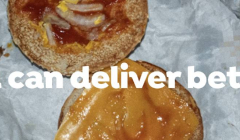
Knorr spotlights fast food fails to deliver better
The campaign from MullenLowe highlights that home made food can be better than takeaways.

The current economic crisis should not push diversity and inclusion down the agenda

Times are tough. And as we head into winter, for many from underrepresented communities in Britain, they’re about to get a whole lot tougher.
The pandemic impacted underrepresented communities far more negatively than the rest of society - and the current cost of living crisis and swingeing impacts of the Autumn budget are only making matters worse.
Don’t be that brand that uses the current economic situation as an excuse to de-prioritise inclusive comms and education around it.
Sharon Flaherty, Founder & CEO, Folk
Recent Office for National Statistics research showed that 55% of the 14 million people living with a disability in the UK are already struggling to pay their energy bills, along with insights into why rising inflation is disproportionately hitting single parent households. At the same time, race equality think tank The Runnymede Trust has found that people who are Black or from a minority ethnicity were twice as likely to suffer than white people in the cost of living crisis.
Why am I telling you this? Because while there have been improvements in creating more inclusive work when it comes to ethnicity, there is still a massive lack of visibility and authentic representation of disabled communities, single parents…the list could go on.
But it’s vital in the coming months that this is addressed. The voices of the underrepresented have already had enough and we all know that in times like these, people rise up and demand to be heard even more. And heard they should be.
While some brands are thinking about recruitment freezes, lay-offs and protecting the bottom line, don’t be that brand that uses the current economic situation as an excuse to de-prioritise inclusive comms and education around it.
I’m sure the comms team at SSE, a firm owned by Ovo Energy would agree, having been forced to issue an apology over an email advising customers to stay warm by ‘doing a few start jumps’, which was condemned by disability rights campaigners and those choosing between feeding their kids or keeping them warm.
A recent survey of the UK’s top 100 marketers revealed that while 70% of brands want to improve inclusivity in marketing and communications, 64% were afraid of getting it wrong.
This is hardly surprising when the same research found that 36% admitted a lack of diversity in their organisations and 47% said they didn’t know enough about diverse communities.
If you don’t have people on your team from underrepresented communities the chances are you won’t know how to represent and reach them authentically.
Agencies and brands must consult with diverse voices to inform their work and make sure it hits the mark and is culturally in tune. If you can't draw on diverse voices from within your organisation there are plenty of partners, groups and charities you can work with.
After all we are, according to Forbes, heading for a period of unrest being dubbed The Great Rebellion, which could translate into possible backlash against brands. So it’s imperative to get representation and inclusivity right in marketing, ads and comms, it's’ what we all should be doing anyway.
And even more importantly, brands must listen to all communities and understand their circumstances and needs. Any brand not understanding their audiences - and I'm not talking about the segmentation we’re all used to working with as that is inherently flawed but that’s a conversation for another day - I’m talking about really understanding the audiences and the different intersections, their lived experiences set against current real world events of which the cost of living crisis is just one of them. If you don’t, you risk making a misstep.
The underrepresentation of minorities in marketing and communications came into sharp focus for me when I was pregnant and told that my unborn child had a life-limiting condition called Patau Syndrome. Shockingly, this led me to realise I hardly ever saw people with disabilities represented in mainstream media and marketing.
Sadly, my baby didn’t make it to full term, but the experience led me to completely shake-up my content and PR agency. Now we make sure our strategies are informed by inclusive insights and our creative work is truly representative too. We’re supported by The Real Folk Panel, our diverse communications consultants who are all advocating for the communities they represent and ensure all work is authentically inclusive, as well as offering a sounding board for those 64% worried about getting inclusive comms right.
It’s what people want and expect from brands. A global survey looking at marketing, inclusivity and diversity found that 57% of consumers are more loyal to brands that commit to addressing social inequities in their actions, and that young people are particularly influenced by inclusivity when it comes to their purchase decisions.
Yes, it’s tempting in the current climate to focus purely on the bottom line and forget about people. But people aren’t goldfish: we remember the brands which act as allies when it matters, not when it suits them. So instead of using the tough financial situation as an excuse to remain part of the dithering 70% who want to improve representation, think of it as an opportunity to make a difference. The time for us all to do better is now.
Sharon runs Folk, a creative communications agency in Cardiff which has been awarded the best small agency at the International Content Marketing Awards for 4 years running. Passionate about the real issues affecting society, including diversity, inclusion and representation, the agency is focused on helping large organisations drive meaningful change through communications.
Looks like you need to create a Creativebrief account to perform this action.
Create account Sign inLooks like you need to create a Creativebrief account to perform this action.
Create account Sign in